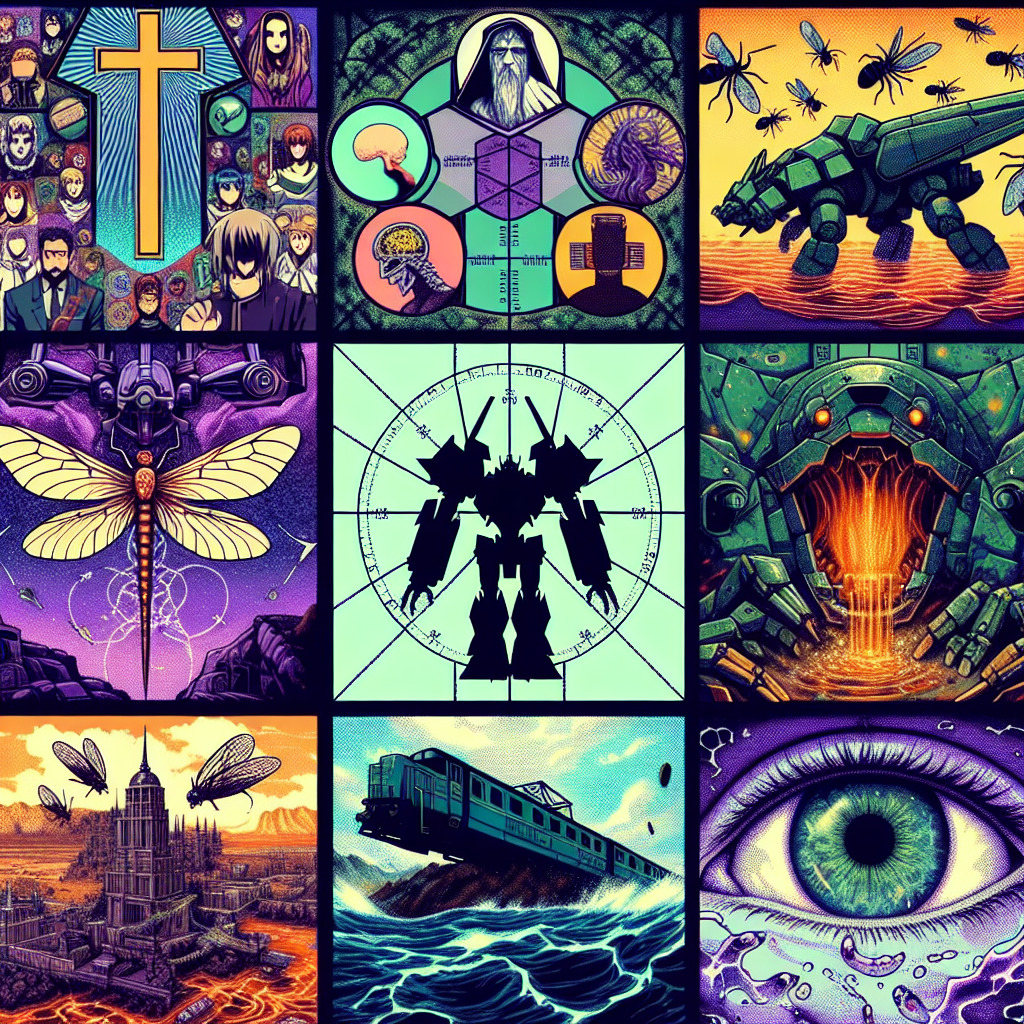Symbolism in Neon Genesis Evangelion
Neon Genesis Evangelion is renowned for its rich and complex use of symbolism. While some of this symbolism is deeply meaningful to the plot and themes of the show, the creators have also admitted that some elements were chosen purely for aesthetic reasons. This blend of intentional and incidental symbolism has led to countless interpretations and discussions among fans and critics alike.
Religious Symbolism
Much of the symbolism in Evangelion draws from Judeo-Christian tradition:
- The Cross: Frequently appears during explosions and in other contexts, symbolizing sacrifice and resurrection. For example, the cross-shaped explosions when an Angel is defeated, or the cross-shaped restraints used to crucify Unit-01.
- Angels: The enemies in the series are named after angels from Christian and Jewish mysticism. Each Angel's design and abilities often reflect aspects of their namesake.
- Tree of Life: The Kabbalistic Sephiroth diagram appears in the opening credits and is central to SEELE's plans. It's also seen in Terminal Dogma, representing the structure of creation.
- Lance of Longinus: Named after the spear that pierced Jesus' side, it has the power to penetrate A.T. Fields. Its role in piercing Lilith and later Unit-01 parallels its mythical use.
- Adam and Lilith: The progenitors of Angels and humans respectively, drawing on creation myths. Their presence in Terminal Dogma represents the origins of life on Earth in the series' mythology.
Psychological Symbolism
The series heavily incorporates psychological concepts and symbolism:
- A.T. Field: Represents the psychological barriers people create to protect themselves from others. This is most explicitly explored in Episode 24 with Kaworu's explanation.
- LCL: Often interpreted as amniotic fluid, representing a return to the womb or primordial state. This is particularly evident during the Third Impact scenes in End of Evangelion.
- Entry Plug: Can be seen as a representation of the womb, with the pilot in a fetal position. This symbolism is reinforced by the pilots' dependency on their Evas, mirroring a child's reliance on their mother.
- Human Instrumentality: Symbolizes the breaking down of individual barriers and return to a collective consciousness. This concept explores themes of individuality versus unity, and the pain of human existence.
Mythological Symbolism
Evangelion also draws on various mythological traditions:
- Marduk Institute: Named after the Babylonian creator god, reflecting the theme of creation and destruction in the series.
- The Three MAGI: Named after the Three Wise Men from Christian tradition. Their role in decision-making parallels the wisdom attributed to their biblical counterparts.
- Eva Units: Often interpreted as modern versions of golems or other mythical protectors. Their berserk modes, in particular, evoke the image of uncontrollable protectors from various myths.
- Spear of Longinus: Beyond its Christian symbolism, it also evokes mythological weapons of power, such as Odin's spear Gungnir.
Visual Symbolism
The series uses various visual motifs symbolically:
- Train Scenes: Often used for introspective moments, symbolizing life's journey. The repeated imagery of Shinji on a train represents his internal struggles and character development.
- Cicadas: Their cries often accompany outdoor scenes, symbolizing the transience of life and the passing of time. This is particularly poignant given the post-apocalyptic setting of the series.
- Water: Frequently used in imagery, can represent purification, rebirth, or the subconscious. Notable examples include the lake where Shinji meets Kaworu and the sea of LCL during Instrumentality.
- Eyes: Close-ups of characters' eyes are frequent, symbolizing the soul or true self. This is particularly notable with Rei, whose red eyes emphasize her otherworldly nature.

A visual representation of various symbolic elements in Neon Genesis Evangelion
Interpreting the Symbolism
While the abundance of symbolism in Evangelion invites deep analysis, it's important to note that not all symbolic elements were intended to have specific meanings. Director Hideaki Anno has stated that some symbols were chosen for their aesthetic impact rather than their traditional meanings.
However, this ambiguity has allowed for a wide range of interpretations, contributing to the enduring popularity and discussion surrounding the series. The layered symbolism allows viewers to find personal meaning and connection to the themes of the show, whether it's the religious imagery speaking to ideas of faith and destiny, or the psychological symbolism resonating with personal experiences of isolation and connection.
Ultimately, the rich symbolism of Evangelion serves to deepen the themes of the series, exploring complex ideas about human nature, existence, and the struggle for understanding in a chaotic world. Whether intentional or incidental, these symbols have become an integral part of the Evangelion experience, inviting viewers to engage with the series on multiple levels and fostering ongoing discussion and analysis.
